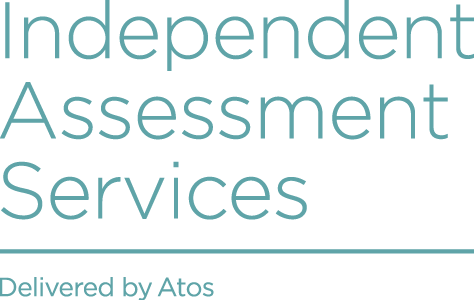Independent Assessment Services (IAS) - delivered by Atos
Age-Friendly Employer
Independent Assessment Services (IAS) - Delivered by Atos
Company Overview
Independent Assessment Services (IAS) is an independent assessment provider assessing Personal Independence Payment (PIP) cases on behalf of the Department for Work and Pensions (DWP). Their role is to help DWP understand how a person’s health condition or disability affects their daily lives.
Their team of trained Health Professionals includes registered nurses (both general and mental health specialists), physiotherapists, occupational therapists and paramedics. All team members are experienced practitioners and trained as disability analysts.
IAS operate in two geographical areas of the UK delivering PIP assessments. One area covers Scotland, the North West, the North East and Yorkshire and Humber. And the other is made up of London, the East of England, the South East and the South West.
Stories
IAS Benefits
At a glance
- Midlife MOTs
- Age related Employee Resource Network (Aeon)
- Carer support with paid and unpaid leave
- Mentoring and reverse mentoring
- Career development pathways for mature workers
- Flexible working (remote, part-time, job share, reduced hours, and more)
- Paid leave for volunteering
- Doctor@Hand Virtual GP
- Carers Policy
- Menopause support
- Private medical insurance
- Flexible retirement options
- Age Champion
- Adaptation of work spaces for older workers
- Access to financial planning
See more benefits and details
A great work-life balance
Employees at IAS work regular hours from Monday to Friday, with no shift work and no weekend working. This offers people the chance to balance their work-life responsibilities. A flexible working scheme is a great benefit for anyone who wants time to look after their children or grandchildren, while a Carers Policy allows employees time to care for a spouse or elderly parents.
Abundant opportunities
IAS encourages workers of every age to constantly challenge themselves and learn new skills so they can future-proof their career and reach their potential. There are special training strands dedicated to older workers, including a Mid-Career Review Cycle which enables people to identify and work towards new ambitions. The organisation’s ‘Future Fit’ programme also helps people to decide which new skills they might want to develop. If people want to take on a mentoring role, retrain, upskill or even relocate, the company does all it can to make that happen.
A network dedicated to age inclusion
The Aeon network ensures everyone at IAS has the same chance to grow and succeed, regardless of their age. It includes a variety of successful projects and programmes, including a reverse-mentoring scheme and Menopause Policy. A new Carers Policy has recently been launched and a Midlife MOT initiative is in development. This aims to keep crucial knowledge and skills within the business by helping IAS colleagues to make sure that everything from their financial wellbeing to physical and mental health is heading in the right direction.
IAS Data
| Total employees | 1,941 |
| Oldest employee | 69 |
| Youngest employee | 17 |
| Employee average age | 43 |
| Total employees aged 45+ | 714 (37%) |
| Employees recruited aged 45+ | 74 (22%) |
| Employees aged 45+ in part-time roles | 208 (43%) |
Gallery
Jobs
Application and interview advice for mature candidates
What does it take to do well when you apply to work at IAS? First, brush up your cv and keep it short. Highlight the important parts, rather than giving every detail. Research the company and the role, and come prepared with some good questions to demonstrate your interest. At the interview itself, enthusiasm for the job and a positive attitude will get you a long way. Show that you’re open to new ideas and ready to learn new skills. (If you already know which skills you might need to improve, so much the better.) Tell the interviewer what you can bring to a team environment and, above all, relax. Good luck!
PAID ROLES
IAS candidates come from a variety of backgrounds, including nurses (RGN, RMN and RNLD), physiotherapists, occupational therapists and paramedics (excluding Northern Ireland). IAS ask that you are registered with your relevant medical body and have, or be nearing, two years post-qualification practical experience.
IAS operates in two geographical areas of the UK delivering PIP assessments. One area covers Scotland, the North West, the North East and Yorkshire and Humber. And the other is made up of London, the East of England, the South East and the South West.
They also assess Employment Support Allowance (ESA) cases and a range of other benefits throughout Northern Ireland against criteria set by the Department for Work and Pensions (DWP), on behalf of the Northern Ireland Department for Communities.
There are a wide range of roles available across the UK – for more information visit the IAS career site.
UNPAID ROLES
IAS doesn't currently offer any unpaid or volunteering opportunities.
WHAT THEY LOOK FOR WHEN HIRING
Candidates must have, or be nearing, two years post registration experience and have broad based clinical knowledge.
They also look for:
- Enthusiasm and a positive attitude
- Ability to apply critical reasoning
- Basic IT skills (including typing skills)
- Excellent communication and soft-skills
- Proven track record for self motivated learning & development
- Flexible and adaptable
- Hardworking
- Team player
- Resilient
- Willingness to learn new skills and different ways of working
- Able to take feedback
- Ability to de-escalate
HOW TO APPLY
IAS use recruitment agencies who screen candidates and provide all necessary checks and paperwork. You then proceed to interview. If successful, the recruitment agency will then take your application to IAS for approval.
Interested applicants can send a copy of their CV and expression of interest to ias.recruitment.team@atos.net and they will make sure it reaches the right recruitment partner for your area.
For more information and vacancies visit the IAS career site.
INTERVIEW PROCESS
The recruitment agency will look over your CV and schedule a telephone interview with you where you’ll learn everything you need to know about IAS, and about the role you are applying for (including all the benefits). A recruiter will also chat with you about your CV, experience and skills.
After the telephone interview, you’ll be asked to explore the IAS recruitment hub and complete an online test which will include a clinical scenario so they can look at your critical analysis skills.
An online video interview will follow where you can get to know each other and discuss your background, skills and why you want the role.
Once you’ve worked your way through these steps, they will let you know if you’ve been successful.
ONBOARDING PROCESS
Onboarding (induction) begins with a day meeting the local team in the centre you’ll be working in.
The rest of the onboarding programme is split into four stages:
1. E-learning
eLearning modules help to introduce you to the PIP assessment process. You will also learn about the company values, the internal systems and how the support network functions.
2. Residential training
The second stage will begin in the classroom as you start to study the PIP process in more detail. This part of your training involves a ‘residential’ with all new joiners staying together in a hotel and learning and sharing experiences along the way. You will need to pass a number of assessments to progress to the next stage of the programme.
3. Observed practice
Next you will be assigned a mentor to oversee the final stages of your training. At this stage you start doing a number of supervised assessments to ensure you are up to the required standard and then, following mentor approval, the unsupervised assessments commence.
4. Approval stage
These unsupervised assessments are part of what’s called a learning curve, where the number of assessments completed are gradually increased over a number of weeks. Auditors carefully review each report giving feedback before you’re granted full approval by DWP.
Contact
IAS
Address
Various locations across the UK
Main website
https://www.mypipassessment.co.uk
Careers website
https://www.ias-careers.co.uk
Careers email
ias.recruitment.team@atos.net



























